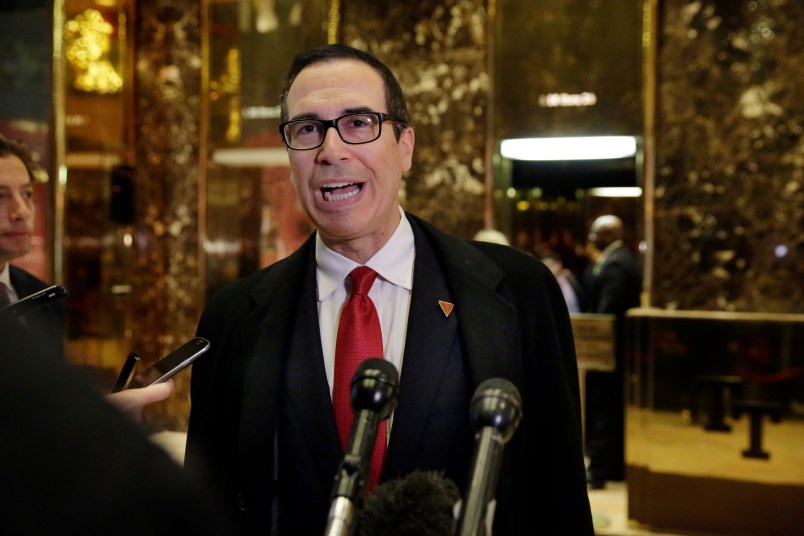ADEN-BADEN, Germany (AP) — The world’s top economic powers dropped a pledge to oppose trade protectionism amid pushback from the Trump administration, which wants trade to more clearly benefit American companies and workers.
Finance ministers from the Group of 20 countries meeting in the southern German town of Baden-Baden issued a statement Saturday that said only that countries “are working to strengthen the contribution of trade” to their economies.
By comparison, last year’s meeting called on them to resist “all forms” of protectionism, which can include border tariffs and rules that keep out imports to shield domestic companies from competition.
The statement from the G20 finance ministers and central bankers helps set the tone for further global economic cooperation.
U.S. Treasury Secretary Steven Mnuchin, taking part in his first international meeting since being sworn in, sought to downplay the wording issue. He said that the statement needed to reflect the discussion at the current summit. “The historical language was not really relevant,” he said.
“We believe in free trade: we are one of the largest markets in the world, we are one of the largest trading partners in the world,” Mnuchin said. “Having said that, we want to re-examine certain agreements… And to the extent that agreements are old agreements and need to be renegotiated we’ll consider that as well.”
He said trade deals need to offer a “win-win situation.”
Mnuchin said the administration would be looking at relationships where the U.S. was buying more than it could sell to its partner, and would be more aggressive in seeking enforcement of existing rules that would benefit U.S. workers through the Geneva-based World Trade Organization. The WTO operates a system of negotiated trade rules and serves as a forum for resolving disputes.
China and European countries had pushed for a stronger affirmation of cross-border trade without tariffs or barriers. Ironically, China and some European states tend to intervene more often in private sector business than the U.S. government.
Canada took a middle approach in the talks, urging a statement supporting free trade but not taking a position on specific wording.
Host Germany dropped the no-protectionism pledge in the early drafting process ahead of the meeting, in apparent hope of not antagonizing the U.S. and then finding a substitute that would also uphold free trade. But attempts to include such language did not find agreement.
Trump and other critics of free trade argue that it can cause jobs, such as in the labor intensive manufacturing sector, to move to lower-cost countries. Proponents say technological advances, such as automation that replaces workers with robots, are more to blame for the loss of jobs in such sectors.
Some advocates, like the International Monetary Fund, readily concede that the benefits of free trade have been uneven across societies, as less skilled workers lose out and the better trained prosper. But they argue that trade restrictions will not help those left behind by the globalized economy and point to better training and education as part of the answer.
Trump has already pulled the U.S. out of a proposed free trade deal with Japan and other Pacific Rim countries. He also has started the process to renegotiate the North American Free Trade Agreement with Mexico and Canada.
Wolfgang Schaeuble, the finance minister of host country Germany, argued that it was not true that officials failed to find common ground. “It’s completely clear we are not for protectionism. But it wasn’t clear what one or another meant by that,” he said.
The G-20 is an informal forum on economic cooperation made up of 19 countries plus the European Union. The finance ministers’ meeting will pave the way for a summit of national leaders in Hamburg, Germany, on July 7-8. Its decisions don’t have the same force as an international treaty but simply depend on individual countries’ promises to follow through on them.
___
Christopher Bodeen in Beijing and Frank Jordans in Berlin contributed to this report.
Copyright 2017 The Associated Press. All rights reserved. This material may not be published, broadcast, rewritten or redistributed.







Jesus, what a bunch of fucking weaklings.
You know all those cries of “don’t normalize!”? You can thank gutless governments and frightened functionaries to make that a pointless statement.
Environmental standards vary from country to country to. Also don’t forget, infrastructure such as sewers, fire, police, etc. vary from country to country. These differences matter when trying to compete.
FIFY
The G19, on the other hand, will be all in favor.
That’s the big thing in all this, I believe.
The WTO and IMF truly do have their problems however, and are not really honest brokers in many respects. They claim to care about emerging countries, but their actions seem often to show that they really don’t. Not to mention, many countries routinely don’t follow any of the rules set forth by these world trade and financial organizations. Countries often turn a blind eye to copyright infringement for instance, and other trade agreements between nations that have been approved by these world bodies.
It may seem gutless now, but I think they’re trying to think ahead in order to protect themselves from us to be honest, particularly if this asshole continues to spout off and disrupt markets around the world. He’s liable to throw a monkey wrench into the whole thing anyway, rules or no rules. That pompous asshole we call a President doesn’t feel a need to follow any rules, here or abroad…and the unprincipled people he’s put in charge of negotiating these agreements also could care less. They’re there to make bank for shareholders they once held sway with imo.